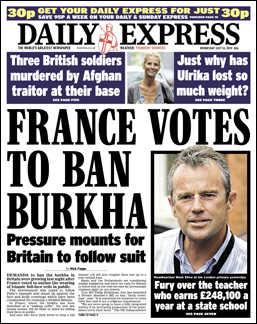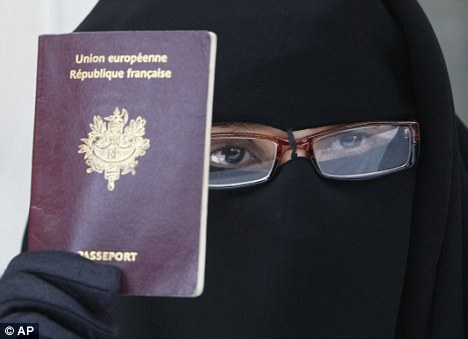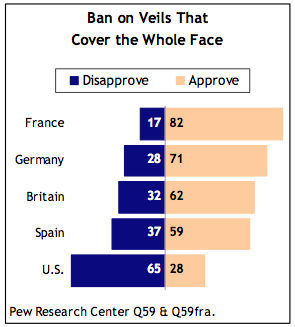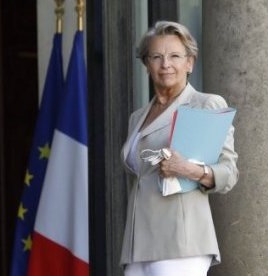Whose “way of life” is France’s lower house protecting? Not the women who wear niqabs.
Madeleine Bunting argues against the French veil ban.
See also Mehdi Hasan at the New Statesman.

Whose “way of life” is France’s lower house protecting? Not the women who wear niqabs.
Madeleine Bunting argues against the French veil ban.
See also Mehdi Hasan at the New Statesman.
France’s lower house of parliament has overwhelmingly approved a bill that would ban wearing the Islamic full veil in public. There were 335 votes for the bill and only one against in the 557-seat National Assembly. It must now be ratified by the Senate in September to become law.
Many of the opposition Socialists, who originally wanted the ban limited only to public buildings, abstained from voting after coming under pressure from feminist supporters of the bill.
After the vote, Justice Minister Michele Alliot-Marie said it was a victory for democracy and for French values. “Values of freedom against all the oppressions which try to humiliate individuals; values of equality between men and women, against those who push for inequality and injustice.”
“Democracy thrives when it is open-faced,” Ms Alliot-Marie told the National Assembly when she presented the bill last week.
The Council of State, France’s highest administrative body, warned in March that the law could be found unconstitutional. If the bill passes the Senate in September, it will be sent immediately to France’s Constitutional Council watchdog for a ruling. Another challenge is possible at the European Court of Human Rights in Strasbourg, where decisions are binding.
See also “France vote to ban full-face veils condemned by Amnesty”,Amnesty press release, 13 July 2010
 Demands to ban the burkha in Britain were growing last night after France voted to outlaw the wearing of Islamic full-face veils in public.
Demands to ban the burkha in Britain were growing last night after France voted to outlaw the wearing of Islamic full-face veils in public.
The Government was urged to follow Paris’s example and stand up against the face and body coverings which have been condemned for creating a divided Britain.
In France, where the burkha has been described as a “walking coffin”, the new law means women will be fined or jailed for hiding their faces in public. And men who force their wives to wear a full Islamic veil will face tougher fines and up to a year behind bars.
Spain and the Netherlands are considering similar legislation and there are calls for Britain to follow suit as the veils become an increasingly common sight on our streets.
Tory MP Philip Hollobone, who has launched a Private Member’s Bill to ban “facial coverings”, said: “It is unnatural for someone to cover their face and it not a religious requirement. We are never going to have a fully integrated society if an increasing proportion of the population cover their faces.”
A ban on burkhas is supported by 99 per cent of Britons, a Daily Express poll found last month.
See also “Brits say banning the burkha is not anti-Muslim”, Daily Star, 14 July 2010
 As France’s parliament debates whether to ban burqa-like Muslim veils, one lawmaker compares them to muzzles, or “walking coffins.” Another proclaims that women who wear them must be liberated, even against their will.
As France’s parliament debates whether to ban burqa-like Muslim veils, one lawmaker compares them to muzzles, or “walking coffins.” Another proclaims that women who wear them must be liberated, even against their will.
Amid little resistance, France’s lower house of parliament will likely approve a ban on face-covering veils Tuesday, and the Senate will probably follow suit in September.
Polls show voters overwhelmingly support a ban. In parliament, criticism was mostly timid, and relatively few dissenters spoke out about civil liberties or fears of fanning anti-Islam sentiment in a country where there are an estimated 5 million Muslims, and where mainstream society has struggled to integrate generations of immigrants.
One obstacle, however, may still stand in the way of a ban: the courts. Law scholars say the ban could be shot down by France’s constitutional watchdog or the European Court of Human Rights. That could dampen efforts under way in other European countries toward banning the veils.
Legislator Berengere Poletti, of Sarkozy’s conservative party, argued that women in such garb “wear a sign of alienation on their faces” and “must be liberated,” even if they say the apparel is their own choice.
Communist Andre Gerin, who also supports a ban, said that “talking about liberty to defend the wearing of the full veil is totally cynical – for me, the full veil is a walking coffin, a muzzle.”
Socialist Jean Glavany, one of the few lawmakers to offer stinging criticism of a ban, said dwelling on questions of French identity and whether burqas are welcome in France “is nothing more than the fear of those who are different, who come from abroad, who aren’t like us, who don’t share our values.” He was also one of several lawmakers to question the bill’s “judicial fragility.”
Associated Press, 12 July 2010
See also “French National Assembly debates burqa ban”, WSWS, 12 July 2010 and “French entrepreneur offers to pay veil fines”,Reuters, 12 July 2010
 Days before French lawmakers are due to vote on a bill that would make it illegal for Muslim women to wear full veils in public, a US poll has found that a majority of Europeans back such a ban while Americans reject it.
Days before French lawmakers are due to vote on a bill that would make it illegal for Muslim women to wear full veils in public, a US poll has found that a majority of Europeans back such a ban while Americans reject it.
The French overwhelmingly endorse a ban on Muslim face coverings, also known as the burqa or the niqab, as do majorities in Britain, Germany and Spain, a survey conducted by the Washington-based Pew Research Center’s Global Attitudes Project found.
More than eight in 10 people in France said they would approve of a ban on Muslim women wearing full veils in public, including in schools, hospitals and government offices, the survey, conducted over three weeks in April and May, found. Just 17 percent of French people were opposed to a ban on the burqa.
Majorities in Germany (71 percent), Britain (62 percent) and Spain (59 percent) said they would support a burqa ban in their own countries. But in the United States, the opposite was true, with two-thirds of Americans saying they were against a ban on full veils in public.
Download the poll report (pdf) here.
The report finds that in Europe and the US “support for a ban on Muslim women wearing a full veil is more pronounced among those who are age 55 and older” and that “those on the right in France, Britain and Germany are more likely than those on the left to approve of a ban on women wearing the full Islamic veil in public places”.
 Britain’s fight against terrorism has been a disaster, because its “flawed, neo-conservative” direction alienated Muslims and increased the chances of terrorist attacks, a former leading counter-terrorism officer has told the Guardian.
Britain’s fight against terrorism has been a disaster, because its “flawed, neo-conservative” direction alienated Muslims and increased the chances of terrorist attacks, a former leading counter-terrorism officer has told the Guardian.
Speaking to mark today’s fifth anniversary of the 7 July attacks in London, Dr Robert Lambert said the atrocity had led the Labour government to launch not just the publicly declared battle against al-Qaida, but a much wider counter-subversive campaign that targeted non-violent Muslims and branded them as supporters of violence.
Lambert, now an academic, served for 30 years as an officer in Scotland Yard’s special branch, dealing with the threat from Irish Republican terrorism through to the menace from al-Qaida. He was head of a counter-terrorism squad, the Muslim contact unit (MCU), which gained intelligence on violent extremists, and won praise from Muslims, even those who have criticised police.
Lambert said the Labour government adopted a “flawed, neo-con analysis to react to 7 July. The view was that this is such an evil ideology, we are entitled to derogate from human rights considerations even further.”
The effect of this, said Lambert, was to cast the net too wide: “The analysis was a continuation of the analysis after 9/11, which drove the war on terror, to say al-Qaida is a tip of a dangerous Islamist iceberg … we went to war not against terrorism, but against ideas, the belief that al-Qaida was a violent end of a subversive movement.”
Lambert said this approach alienated British Muslims, as those who expressed views such as opposition to the wars in Iraq and Afghanistan, also held by non-Muslims, feared that holding such beliefs made them suspects. “The best way of tackling al-Qaida is to reassure the communities where it seeks support and recruits, is to show those communities that their grievances can be expressed legitimately,” Lambert said.
He said the fight needed to focus solely on the terrorists, and not on those who may share some of their political views, but who will express them peacefully. He said that British policies handed the terrorists propaganda victories. Such policies included the Iraq war, civilian casualties in Afghanistan, the torture of terror suspects at Guantánamo and elsewhere, rendition, the muted response to Israel’s attack on Lebanon and the attempt to hold terror suspects in the UK for 90 days without charge.
 France’s justice minister went before parliament to defend a hotly debated bill that would ban burka-style Islamic veils in public, arguing that hiding your face from your neighbours is a violation of French values.
France’s justice minister went before parliament to defend a hotly debated bill that would ban burka-style Islamic veils in public, arguing that hiding your face from your neighbours is a violation of French values.
Michele Alliot-Marie’s speech at the National Assembly marked the start of parliamentary debate on the bill. It is widely expected to become law, despite the concerns of many French Muslims, who fear it will stigmatise them. Many law scholars also argue it would violate the constitution.
The government has used various strategies to sell the proposal, casting it at times as a way to promote equality between the sexes, to protect oppressed women or to ensure security in public places.
Ms Alliot-Marie argued that it has nothing to do with religion or security – she argued simply that life in the French Republic “is carried out with a bare face”.
“It is a question of dignity, equality and transparency,” she said in a speech that made little mention of Muslim veils. Officials have taken pains to craft language that does not single out Muslims: While the proposed legislation is colloquially referred to as the “anti-burka law”, it is officially called “the bill to forbid covering one’s face in public”.
Press Association, 7 July 2010
See also Al Jazeera, 7 July 2010
The European Convention on Human Rights is the basis for our rights and freedoms. Crucially, it provides for freedom of expression, the right to protest, to stage controversial political theatre or to write an independent article. It also protects the right of individuals to choose their religious beliefs.
For this reason, I cannot support calls in the UK and across Europe to ban Muslim women from wearing the burqa or other garments that cover the entire body in public.
Have we become so arrogant as to believe that every woman who would wear a burqa is necessarily oppressed? Or so fearful that we see a potential terrorist behind women who cover themselves out of religious belief?
Thorbjørn Jagland, Secretary General of the Council of Europe, in the Independent, 7 July 2010
France moves closer to banning the full-face veil today when its parliament begins debating a law that would outlaw the wearing of the burqa or the niqab anywhere in public. It is a measure that seems popular with the public. Polls suggest 70% back a ban.
The numbers that wear the full-face veil in France are tiny. Perhaps 2,000 and then the tourists from the Gulf, who like to shop in the luxury stores on the Champs Elysees.
The French government says this is not an argument about religion but about values. By adopting this legislation the French are insisting that those who live in France abide by their values. As the writers of the legislation say, hiding your face in public is “an offence to the nation’s values”. It violates the republican ideals of secularism and gender equality.
The French President, Nicolas Sarkozy, said it was “a sign of debasement”. The Immigration Minister, Eric Besson, described the burqa as a “walking coffin”. The French Prime Minister, Francois Fillon, said Muslims who wear face coverings are “hijacking Islam” and provoking a “dark and sectarian image”.
Gavin Hewitt’s Europe, 6 July 2010
See also “French opposition to boycott vote on burqa ban”, AFP, 6 July 2010
Hidden cameras in areas of Birmingham with large Muslim populations will be removed and any counter terrorism involvement stopped, police say.
A total of 218 cameras – 72 hidden – were put up in the Washwood Heath and Sparkbrook districts and paid for from a Home Office counter-terrorism fund. Residents said they were not consulted about it. Sharon Rowe, Assistant Chief Constable of West Midlands Police, apologised and said “mistakes had been made”.
The CCTV and number plate recognition cameras have not been switched on and officials involved promised full public consultation last month.
About 300 people attended a public meeting at the Bordesley Centre in the Sparkbrook area of the city on Sunday to discuss the issue. Senior police, council officers, politicians and civil liberty campaigners addressed the audience as well as campaigners fighting to get the cameras removed.
See also “Covert spycam u-turn”, The Stirrer, 4 July 2010
And Birmingham Mail, 5 July 2010
The video above is of Salma Yaqoob’s speech at yesterday’s rally (via Socialist Unity). Other speeches can be viewed here.